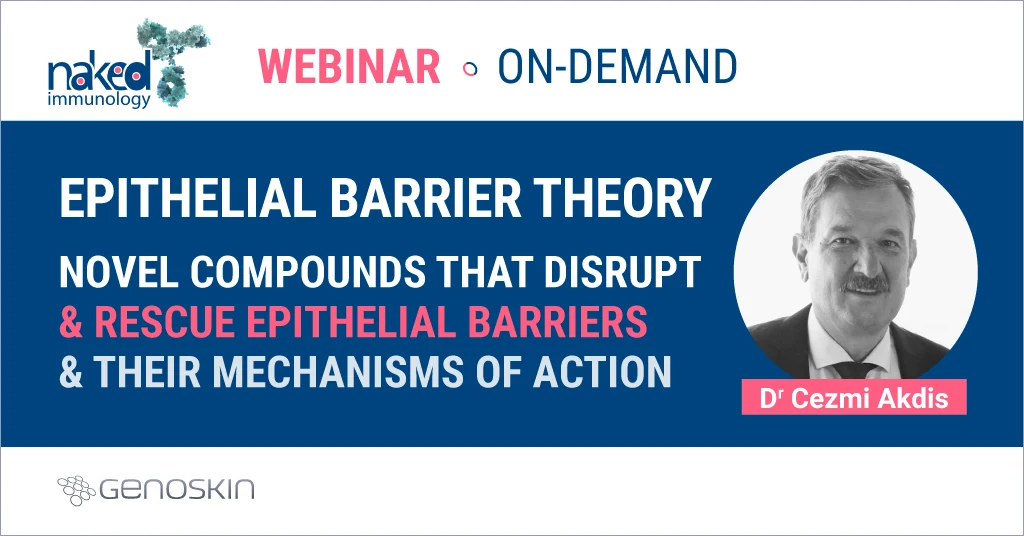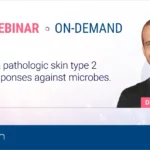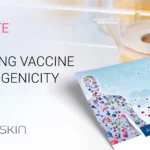Top-level science through the eyes of an expert.
The fifth Webinar.
The fifth webinar in the Naked Immunology series is now scheduled on June 30, 2023 at 8 a.m. (PST), 11 a.m. (EST), 5 p.m. (CET). The webinar is open to English-speaking participants with a solid scientific background. Featured speaker is Dr. Cezmi Akdis, the director of the Swiss Institute of Allergy and Asthma Research (SIAF) in Davos and Professor in Zurich University Medical Faculty.

In this webinar, Dr. Akdis will focus on the effects of toxins and chemicals on epithelial barriers in humans and animals, specifically focusing on the skin.
Humans and many domestic and wild animals are exposed to a variety of toxins and chemicals every day. It is estimated that more than 350,000 new chemicals have been introduced to our lives, mostly without any reasonable control of their toxicity during the last 60 years. There is a plethora of studies pointing to the rapid rise of disease prevalences linked to the exposure to many of these harmful substances during this period with their implications on disturbed skin and mucosal epithelial barrier functions. According to the epithelial barrier theory, exposure to many of these substances damages the epithelium on skin, lung and intestine and together with the involvement of microbiome and immune system a chronic inflammation develops in the affected organs and even in distant organs. Extensive evidence is being developed in our lab by screening more than 100 epithelial barrier disruptor molecules.
Recently developed methods representing as close as possible to human tissues, such as human native skins, lung, gut and skin organoids, organs-on-a-chip, induced pluripotent stem cells, targeted and non-targeted proteomics, spatial and single cell transcriptomics, and electric impedance spectroscopy are being used. Mouse models have been performed to support the in vivo relevance of these human 3D tissue-based assays. Many ingredients of laundry and dishwasher detergents, rinse aids, toothpastes, shampoos, house-hold cleaners, particulate matter, processed food additives and emulsifiers have been studied. Their epithelial barrier damaging, and pro-inflammatory mechanisms have been identified as oxidative stress, inflammasome activation, apoptosis induction and direct interference and damage to epithelial barrier forming molecules.
To heal, slow down or mitigate their barrier disrupting effects, more than 20 candidate rescue molecules have been identified and used in experiments with pre-exposure and during exposure to disruptors. Decreased release of epithelial alarmins and a wide range of other proinflammatory cytokines and chemokines, protection of the epithelial barrier integrity, and decreased oxidative stress have been achieved by selected classes of rescue molecules. These data demonstrate the effect of direct epithelial barrier disruptor molecules and their mechanisms of action analyzed in human and mouse models. In addition, it opens a possibility to heal damaged epithelial barriers by pathway-specific compounds.
Replay now available!
After submitting this form, you will receive an email containing the link to access the replay.
About the speaker:

Dr. Cezmi Akdis
Director | Swiss Institute of Allergy and Asthma Research (SIAF)Dr. Cezmi Akdis is the director of the Swiss Institute of Allergy and Asthma Research (SIAF) in Davos and Professor in Zurich University Medical Faculty.
He has honorary professorships from Beijing (China), Wuhan (China) and Bursa Uludag Universities (Turkey). He is a Senate Member of the Swiss Academy of Medical Sciences.
Dr. Cezmi Akdis has published 690 peer-reviewed articles. His h-index is 142 and he was selected as a highly cited author consecutively in 2016-2017-2018-2019-2020 and 2021 by Clarivate (Thomson Reuters). He acted as the President of the European Academy of Allergy & Clinical Immunology (15,000 members) between 2011-2013. He was the editor of Global Atlases of Allergy, Asthma I-II, Chronic Rhinosinusitis and Allergic Rhinitis.
He was the founder and organizer of the World Immune Regulation Meetings, Davos I-XVI (600-1,000 participants). He has contributed the Allergy Chapters in the textbooks that are studied in Medical Schools, Such as Nelson Textbook of Pediatrics, Middleton Essentials of Allergy. He is one of the Editors of the textbook Pediatric Allergy Immunology. He is currently the Editor-in-Chief of the Allergy journal, number one journal of the Allergy Clinical Immunology specialty, impact factor 14.71.
Dr. Cezmi Akdis’ major scientific contributions are on immune regulation and allergen tolerance, plasticity of antigen-specific T cells 1995, human T regulatory cells 1996, immune suppressive role of histamine receptor 2 2000, human Type 2 NK cell subset 2001, human regulatory NK cells 2007, regulatory innate B cell subset 2017, regulatory innate lymphoid cells 2019. His current research is the continuation of his epithelial barrier theory studies starting from mechanisms of eczema 2000, mechanisms of epithelial shedding in asthma and chronic rhinosinusitis 2003, endotypes of asthma, chronic rhinosinusitis and atopic dermatitis 2011, epithelial barrier theory for the development of allergic and autoimmune diseases 2006 – 2022. Cezmi Akdis is also the author of more than 40 publications on COVID including one of the first ones published on 19 February 2020, including pathophysiology, risk factors, severity, clinical characteristics and how to handle allergy and asthma patients during the pandemic.
Watch the replay of past Naked Immunology Webinars
Replay now available!
Enter your email address to access the replay.
Comments are closed.




